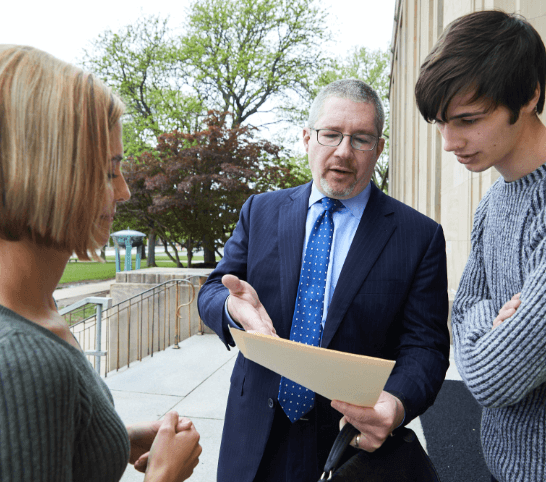How I can help if you are accused of a Title IX Violation
If a student is charged with a Title IX violation by their school, they are most likely facing suspension or expulsion and possibly a mark on their transcript. This allegation and process must be met with an experienced advocate by your side. When retained, I move quickly to stop the student from speaking to the school, assess the case and plan a strategy.
Title IX Sexual Assault: Defending Against Complaints
Under Title IX of the Education Amendments of 1972 and its subsequent interpretations by the Department of Education’s Office of Civil Rights, allegations of sexual assault on college campuses are treated very seriously. Since 2011, the burden of proof that is required to prove that a sexual assault is much lower than it is in a criminal court setting, making it very easy for those accused to be convicted. It is important for people who are facing such accusations to understand what is considered to be a sexual assault on college campuses, how schools approach these cases and how the process works.
What Is Sexual Assault on a College Campus?
Sexual assault on college campuses is defined broadly to include a wide range of sexual acts. It includes unwanted sexual touching, fondling, sodomy, attempted rape, forcible oral sexual contact and others. The acts must not be consensual, but defining consent can be problematic. If an alleged victim is coerced or manipulated into engaging in sexual activity, the person who manipulated or coerced the alleged victim may be accused of campus sexual assault.
How the Dear Colleague Letter Changed the Rules Under Title IX
On April 4, 2011, the Office for Civil Rights issued the “Dear Colleague” letter, which changed the rules under Title IX regarding how schools handle sexual assault allegations on college campuses. The letter includes directives to schools about the steps that the schools must take when they receive reports of sexual harassment or sexual violence.
Schools are required to immediately investigate the allegations and to take steps to end any sexual violence or harassment that may have occurred and to prevent it from happening again. Schools are also required to protect the alleged victims, and they must have grievance procedures in place so students can make complaints about alleged sexual violence or harassment.
One of the more troubling aspects of the grievance procedure is that schools are only supposed to use the lowest burden of proof possible. This means that the complaint must only be proven by a preponderance of the evidence to convict a defendant, which is much lower than the burden of proof that is required in criminal courts. In criminal courts, sexual assault allegations must be proven beyond a reasonable doubt before defendants can be convicted.
Also unlike criminal courts, colleges must allow accusers to appeal findings of not guilty, and the adjudication hearing is expedited and must be held within 60 days. The OCR also strongly discourages the ability of the accused to cross-examine the accuser, making it significantly more likely that innocent people will be convicted.
Prior to this letter, schools applied a higher burden of proof which was “by clear and convincing evidence” in their hearings about on-campus sexual assaults, and the adjudication hearings were not expedited. The accusers also could not appeal not guilty findings. The Department of Education failed to explain the legal basis it relied on to make these changes that negatively impact the due process rights of students who are accused.
Understand The Consequences
When accused of violating a school disciplinary code, there is far more at stake than is often first realized. Possible outcomes include suspension and even expulsion. Your child’s record may have a permanent notation when it’s sent on to graduate schools or potential employers. Your child could lose financial aid, scholarships, and even on-campus housing.
Call us for a no-obligation consultation
Affirmative Consent Laws
The affirmative consent laws vary from state to state, but there has been a push to pass legislation in the states requiring people to get verbal, affirmative consent from each other before engaging in sexual activity. On Sept. 28, 2014, California’s affirmative consent law was signed by Gov. Jerry Brown, setting a model for other states to follow. This law mandates that students must get both explicit and verifiable consent prior to engaging in sexual activity. They must also get continuing consent from their partners, and the law makes it unclear how often the parties must check with each other to see if they have the consent to continue.
Critics of the law have rightly pointed out that it threatens students’ due process rights. Since then, numerous states have been considering their own affirmative consent laws, and similar policies have been enacted by numerous campuses across the U.S. The push at schools nationwide is called the “Yes means Yes” initiative, and it continues to grow.
How the Process Works
Every school has a different procedure but most use a variation of the following. When a complaint of sexual harassment or assault is filed, the school immediately begins an investigation. The accused party is not given any chance to discuss the case or to mediate it with the other party. They must go to a hearing that is called an adjudication. The process is expedited, and the hearing is scheduled within 60 days of the complaint. During the investigative process, the school must take steps to protect the accuser and to take action to prevent further sexual assaults or harassment from happening. Both parties are allowed to call witnesses at the hearing, but cross-examination of the accuser is discouraged.
It is very easy for accused students to be convicted because of the low burden of proof that is required. If they are found to be not guilty, their accusers are allowed to appeal. Students who are convicted of the offense may be expelled from school and have permanent marks on their academic records that can follow them for life, regardless of whether or not they are criminally prosecuted and convicted. Because of the dangers to students who are accused of campus sexual assault and the high risk of conviction, it is important for students to seek help from an attorney who is experienced with defending against Title IX allegations against students.



